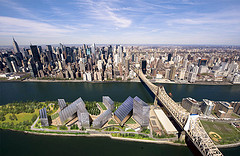
Rendering of Cornell’s planned Roosevelt Island campusCornell University, in partnership with Technion-Israel Institute of Technology will build a 2 million-square-foot applied science and engineering campus on Roosevelt Island, Mayor Michael Bloomberg announced today.
After months of speculation surrounding who would receive the city’s blessing to build the tech campus, part of Bloomberg’s Applied Sciences NYC initiative, front-runner Stanford University dropped out of the race this past Friday, saying only that the city and Stanford “could not reach mutual goals.” Cornell was thought to be the most likely winner in the absence of the west coast university.
Cornell also announced Friday that it received a donation of $350 million to be put toward the project from an anonymous donor, according to a statement from the mayor’s office.
Among the reasons listed for selecting Cornell and Technion were “the financing capacity of the consortium, the focus of the consortium on the collaboration between academia and the private sector, and the overall capacity of the partnership to execute the project,” the statement said. The city will make a $100 million capital contribution for “site infrastructure, construction, and related costs.”
Cornell and Technion have agreed to a 99-year lease for the Roosevelt Island site, and will retain an option to purchase the land at the end of the term, for $1. Cornell will develop the campus, and will assume financial responsibility for its “establishment and operations,” the statement said.
The Bloomberg administration has outlined an ambitious program for the technology campus, which is slated to be completed by 2043, at which point it should house 2,500 students and 280 faculty members, and will increase the number of engineering students enrolled in full-time post-secondary education in the city by 70 percent. Cornell and Technion are also losing no time getting the project off the ground. They will open an off-site location next year, the statement said, and the first phase of the Roosevelt Island site will be complete by 2017.
“When people look back 100 years from now, I believe that they will remember today as a signal moment in the transformation of the city’s economy,” Deputy Mayor Robert Steel said in the statement. “This is an inflection point in an economic renaissance that will position New York City for outsized success in the decades and centuries to come.”
The campus, as Cornell and Technion have proposed it, will also become one of the most energy-efficient buildings in the world, according to the statement. One of the buildings in the first phase of development will be what is known as a “net-zero” building, meaning it uses no more energy than it produces. The well field and solar array included in the plans would each be the largest in New York City if they were built today. — Guelda Voien